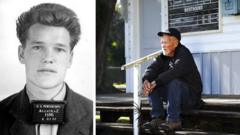Charlie Hopkins, the man who entered Alcatraz in 1955, remembers the eerie silence of the notorious prison, the "deathly quiet" punctuated only by distant ship whistles. Now living in Florida at the age of 93, Hopkins recalls his time behind bars while discussing the recent statements made by former President Donald Trump regarding the potential reopening of the now-abandoned facility.
In an exclusive interview, Hopkins detailed his journey to Alcatraz, where he served a 17-year sentence for kidnapping and robbery. He vividly described life in Alcatraz as otherworldly, lacking the basic comforts found in contemporary jails, with no radios or adequate reading libraries. "There was nothing to do," he lamented, saying most of his time was spent cleaning and keeping his cell in order, since distractions were rare.
Hopkins' experiences were colored by the infamous company he kept during his time on the island, sharing space with notorious figures like Al Capone and the "Birdman of Alcatraz." Though Alcatraz was designed for the worst of the worst, he found ways to push boundaries and ended up in solitary confinement for his attempts to assist other inmates with escape plans, including some unsuccessful efforts that resulted in being locked away for six months.
The facility's closure in 1963 came years after some of the most daring escape attempts, leading to the prison becoming a museum after the government deemed it more cost-effective to build new prisons. Despite its dilapidated state, Trump views Alcatraz as a viable option for housing the country’s most dangerous offenders, a proposition that has drawn skepticism from historians and experts alike.
Hopkins questions the plausibility of Trump's plan. "It would be so expensive," he said, noting that essential infrastructure improvements would be necessary to even consider reopening the facilities. Beyond the financial burdens, he argued that such statements might be more of a political strategy than a genuine intention, hinting that they serve to communicate a tough-on-crime message to the public.
Reflecting on his life since his release in 1963, Hopkins took the opportunity to share insights from his past, highlighting the deep personal and psychological issues that led him into a life of crime. Despite his support for Trump, he expressed doubts over the former president's commitment to bringing Alcatraz back into operation, suggesting it's more about rhetoric than reality. It's a distant memory now, but for Hopkins, the echoes of Alcatraz remain a significant chapter in his life.
In an exclusive interview, Hopkins detailed his journey to Alcatraz, where he served a 17-year sentence for kidnapping and robbery. He vividly described life in Alcatraz as otherworldly, lacking the basic comforts found in contemporary jails, with no radios or adequate reading libraries. "There was nothing to do," he lamented, saying most of his time was spent cleaning and keeping his cell in order, since distractions were rare.
Hopkins' experiences were colored by the infamous company he kept during his time on the island, sharing space with notorious figures like Al Capone and the "Birdman of Alcatraz." Though Alcatraz was designed for the worst of the worst, he found ways to push boundaries and ended up in solitary confinement for his attempts to assist other inmates with escape plans, including some unsuccessful efforts that resulted in being locked away for six months.
The facility's closure in 1963 came years after some of the most daring escape attempts, leading to the prison becoming a museum after the government deemed it more cost-effective to build new prisons. Despite its dilapidated state, Trump views Alcatraz as a viable option for housing the country’s most dangerous offenders, a proposition that has drawn skepticism from historians and experts alike.
Hopkins questions the plausibility of Trump's plan. "It would be so expensive," he said, noting that essential infrastructure improvements would be necessary to even consider reopening the facilities. Beyond the financial burdens, he argued that such statements might be more of a political strategy than a genuine intention, hinting that they serve to communicate a tough-on-crime message to the public.
Reflecting on his life since his release in 1963, Hopkins took the opportunity to share insights from his past, highlighting the deep personal and psychological issues that led him into a life of crime. Despite his support for Trump, he expressed doubts over the former president's commitment to bringing Alcatraz back into operation, suggesting it's more about rhetoric than reality. It's a distant memory now, but for Hopkins, the echoes of Alcatraz remain a significant chapter in his life.




















